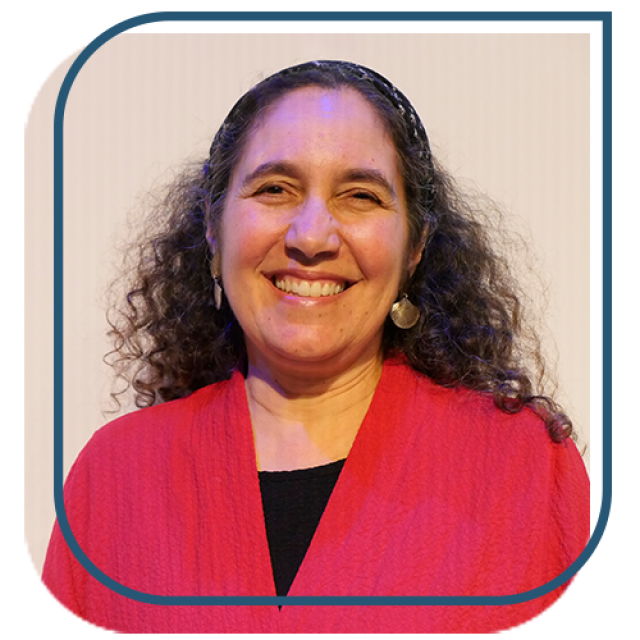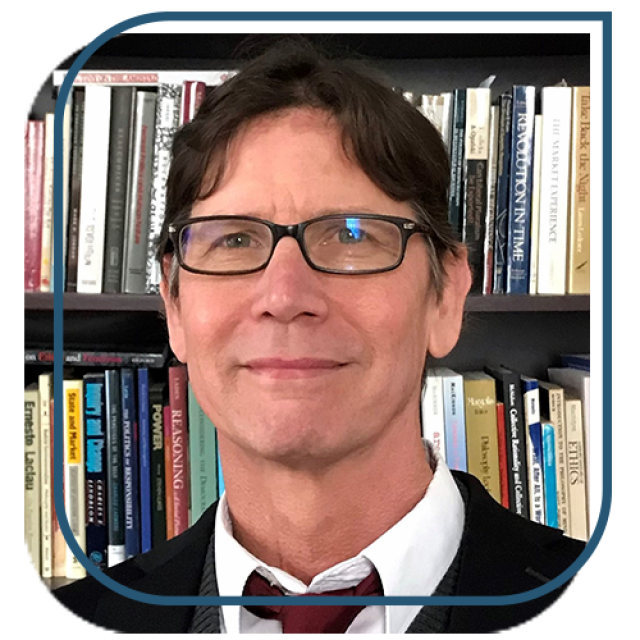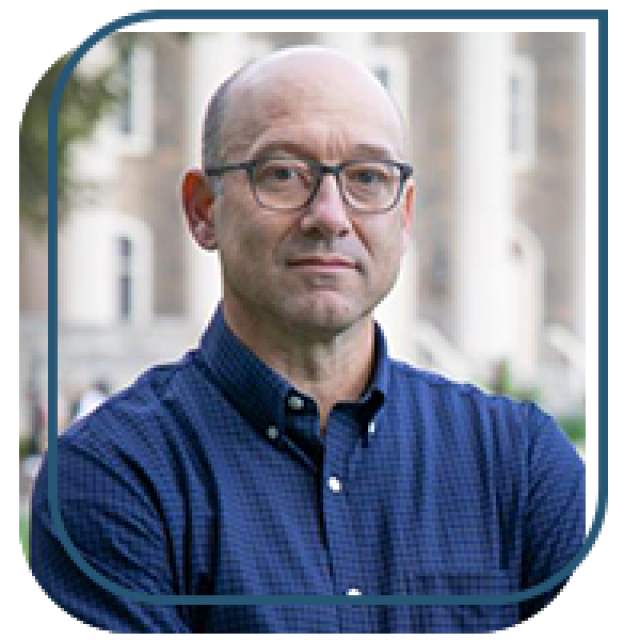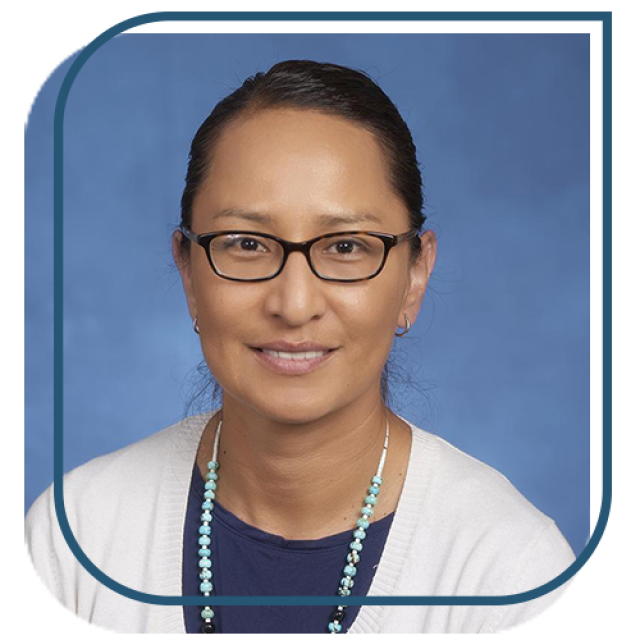About Us
The Initiative's staff and affiliated faculty bring a wealth of diverse expertise and experience to supporting our work with educators. Our team's pedagogical and content experts work with school educators to facilitate professional learning in how to approach, teach, and critically discuss difficult topics in K-12 spaces. Educators work directly with inquiry experts with backgrounds rooted in classroom experience. This work is enriched by connecting with Penn State affiliated faculty sharing their content expertise and collaborating with teachers to support classroom application.
Initiative Staff

Director, Holocaust, Genocide and Human Rights Education Initiative at Penn State and Hammel Family Human Rights Initiative
Assistant Professor in Journalism at Penn State
Boaz Dvir directs the Hammel Family Human Rights Initiative and the Holocaust, Genocide and Human Rights Education Initiative at Penn State. He served as operations manager at the University of Florida’s Lastinger Center for Learning, which provides professional development to educators in several states. An award-winning filmmaker, Dvir tells the stories of ordinary people who transform into trailblazers. They include an inner-city schoolteacher who emerges as a disruptive innovator and a national model (A Class of Her Own); a World War II flight engineer who transforms into the leader of a secret operation to prevent a second Holocaust (A Wing and a Prayer); a truck driver who becomes an effective child-protection activist (Jessie’s Dad); and a Holocaust survivor who sets out to kill his father’s Nazi executioner (Cojot).

Assistant Director, Holocaust, Genocide and Human Rights Education Initiative at Penn State; Assistant Research Professor
Dr. Danielle Butville, assistant director, is a teacher educator whose research and practice explores practitioner inquiry as a form of professional learning and inquiry-based learning for K-12 students. As a former classroom teacher, she contributes expertise in the integration of school curricula with students’ curiosities, as a way to foster inquiry communities in K-12 classrooms. In recognition of her student-centered scholarship, Dr. Butville was awarded a grant from the Conference on English Educators (CEE) and the James Moffett Memorial Award by the National Council of Teachers of English (NCTE).

Education Program Specialist, Holocaust, Genocide and Human Rights Education Initiative at Penn State
Mallory Herd is a former elementary education teacher, educational consultant, and Director of Curriculum and Instruction. Mallory earned her B.S. in Elementary Education from Penn State University in 2011 and her M.Ed. in Special Education from Edinboro University of Pennsylvania in 2014. With a background in curriculum design and instructional technology, Mallory is dedicated to creating innovative and impactful learning experiences. Her areas of educational interest are supporting teachers in creating an inquiry-based environment which engages all students in critical thinking and reflection. She is skilled in designing tailored professional learning workshops, fostering collaboration, and leveraging emerging technologies to enhance teaching and learning.

Karen Scher is a thought leader in the field of education, with a particular focus on English Language Arts (ELA) and social studies education. Karen earned her Bachelor of Arts from Colgate University and Masters in Urban Secondary English Education from the University of California, Berkeley. Karen worked for ten years as an English, History, and Humanities teacher at several public high schools, infusing inquiry and student-centered learning into her practice. Karen went on to work at the educational nonprofit Facing History & Ourselves for ten years, training thousands of teachers and school leaders to humanize their classrooms and navigate critical conversations to foster civic discourse in school communities. She is a skilled facilitator who has also led teams to design and lead webinars, workshops, and in-depth professional learning engagements across a range of educational topics.

Education Program Specialist, Holocaust, Genocide and Human Rights Education Initiative at Penn State
Kayleen Sidisky is a former middle and high school social studies teacher. Kayleen earned her Bachelor of Science in Social Studies education from Bloomsburg University of Pennsylvania in 2008 and a Master of Arts in History from Slippery Rocky University of Pennsylvania in 2016. During her time in the classroom, she infused inquiry and multicultural education into her practice. She wrote courses and curriculum that encouraged students to develop a deeper understanding and appreciation for different cultures, perspectives, and ways of thinking.

Assistant Research Professor, Holocaust, Genocide and Human Rights Education Initiative at Penn State
Dr. Yun-chen Yen is a teacher educator who studies and teaches practitioner inquiry as a form of professional learning for educators across the career span. Yun-chen received her B.A. in Foreign Languages and Literature from National Tsing Hua University in Taiwan and her M.Ed. and doctorate in Curriculum and Instruction from Penn State. Prior to her doctoral studies, Yun-chen was a teacher of English as a Foreign Language in academic and vocational high schools in Taiwan. In her recent studies, she examines the development of collective teacher efficacy through inquiry engagement, especially through the lens of emotions and social networks.

Program Co-Facilitator
Liaison for the Holocaust, Genocide and Human Rights Education Initiative
Lecturer in Education at Penn State Berks
Guadalupe Kasper is the Liaison for the Holocaust, Genocide and Human Rights Initiative at Penn State Berks. She is a faculty member at Penn State Berks in the Elementary and Early Childhood Education (EECE) Program. She teaches Curriculum and Instruction 280, “Teaching English Language Learners” for the EECE Program at Berks. Additionally, Guadalupe teaches courses in Sociology and Anthropology at the campus. Guadalupe is trained in Anthropology and has engaged in educational and ethnographic research around bilingual and family literacy as well as home and school community collaborations. As faculty, she is an active member and mentor of the Social Justice Collaborative and the Antiracism Across the Curriculum Initiative at Berks. Both of these provide collaborative support for faculty teaching race and racism across all disciplines as well as support students in their own inquiry around matters of social justice. In addition to teaching at Berks, Guadalupe is the lead administrator for the Penn State Berks Educational Partnership Program (PEPP). PEPP is a college preparatory partnership program that combines academic, career, and social support for high school students in the Reading School District. She belongs to and supports a number of campus-wide initiatives around Diversity, Equity, and Inclusion including the support of campus community engagement and local service-learning initiatives. She also teaches part-time as an Adult ESL Instructor for the Literacy Council of Reading and Berks County and serves as school board member in the Wilson School District in Berks County.

Program Co-Facilitator, Holocaust, Genocide and Human Rights Education Initiative at Penn State
Jami Cunningham is a current 5th grade ELA/SS teacher in the Southern York County School District. Jami earned a Bachelors of Science from York College of Pennsylvania in 2011, in Elementary Education (K-6) and a Masters in Education, Reading Specialist, from York College of Pennsylvania in 2019. As a classroom teacher, she is always looking for opportunities to bring inquiry in the classroom and provide students with the opportunity to explore different perspectives and be independent thinkers who question the world around them. She strongly believes that inquiry based learning has allowed her students to explore US History in a more engaging way while also allowing them to discuss and share their opinions and ask questions on a much deeper level.

Graduate Assistant, Holocaust, Genocide and Human Rights Education Initiative at Penn State
Elizabeth Hinchcliff is a doctoral candidate in Curriculum and Instruction and Pennsylvania State University. Her research interests lie in the intersection between teacher beliefs, identities, and learning across the career span. She previously taught 6th grade math for five years and loves working with young adolescents.

Program Co-Facilitator, Holocaust, Genocide, and Human Rights Education Initiative at Penn State
Dr. Ryan Lewis is a classroom teacher, with experience working in the special education sector of K-12 public schools. During his professional career, in education, he has worked in settings which range from elementary learning support to life skills support, at the secondary level. Ryan completed his doctoral degree in educational leadership (2020) with a focus on examining the well-being and self-efficacy of special education practitioners. He is an advocate of providing scaffolded support for individuals and groups who may be otherwise marginalized. Ryan brings continuous in-service classroom experience, with a background in academia, to the Initiative. He leads with a collaborative approach to identify areas of needed development, while incorporating strength based analytical approaches, to facilitate progress.
Initiative Affiliated Faculty
The Initiative’s affiliated faculty contribute expertise in teaching difficult social and historical topics, use of media in the classroom, trauma-informed pedagogy, equity and diversity, race and identity, the Holocaust, gender studies, human rights violations, international law, art education, and more. Educators connect with experts from the College of Education, the College of the Liberal Arts, Penn State Law, the Donald P. Bellisario College of Communications, the Center for Science and the Schools, the Jewish Studies Program, and the Humanities Institute.

Associate Professor in History and Jewish Studies at Penn State
Dr. Eliyana Adler is an historian of the modern Jewish experience in Eastern Europe with particular interests in the history of education, religion, gender studies, Holocaust historiography and memory. Her first book, In Her Hands: The Education of Jewish Girls in Tsarist Russia (2011) traced the emergence and development of formal schooling for Jewish girls in pre-revolutionary Russia. More recently, she published Survival on the Margins: Polish Jewish Refugees in the Wartime Soviet Union (2020), about the experiences and memory of a large group of Polish Jews who spent WWII in the unoccupied regions of the USSR. At present, Adler is researching memorial books as well as working on other related projects.

Associate Professor of Psychology at Penn State
Senior Research Associate in the Rock Ethics Institute
Dr. C Daryl Cameron is an associate professor in the Department of Psychology and a senior research associate in the Rock Ethics Institute. He completed a summer post-doctoral appointment at the Duke University Kenan Institute for Ethics and was a Fellow at the Stanford University Center for Compassion and Altruism Research and Education (CCARE). Cameron is also a member of the Moral Psychology Research Group, an interdisciplinary group of psychologists, neuroscientists, and philosophers who study moral cognition. Dr. Cameron’s research and teaching focus on the psychological processes involved in empathy and moral decision-making. Much of his work examines motivational factors that shape empathic emotions and behaviors toward others. In his second line of research, Cameron uses tools from social cognitive psychology—including implicit measurement and mathematical modeling—to understand individual differences in moral intuitions and empathy for pain. Dr. Cameron’s research has been funded by multiple grants from the National Science Foundation. His work has been published in venues such as the Journal of Personality and Social Psychology, Psychological Science, and Personality and Social Psychology Review, and in popular outlets such as the New York Times. His research on moral judgments about implicit racial bias received the Morton Deutsch Award for Best Article from the International Society for Justice Research. To learn more about his research, please visit the Empathy and Moral Psychology Lab web page (https://emplab.la.psu.edu).

Professor of Philosophy and Political ScienceDirector of Penn State Humanities Institute
Dr. John Christman is Professor of Philosophy, Political Science and Women's Studies at Penn State and Director of the Penn State Humanities Institute. He has published widely in the areas of social and political philosophy and ethics, including Social and Political Philosophy: A Contemporary Introduction.

Associate Professor of Human Development and Family
Director, Child Maltreatment Solutions Network
Dr. Christian Connell is an Associate Professor of Human Development and Family Studies and Director of the Child Maltreatment Solutions Network at the Pennsylvania State University. His research focuses on individual, family, and system-level outcomes of youth who have been maltreated or involved in the child welfare and other child-serving systems, as well as the effectiveness of community-based interventions to reduce adverse outcomes associated with maltreatment and trauma. He has been involved in numerous state-level efforts to support the development and dissemination of trauma-informed care practices, particularly focused on the needs of children and families and is the co-author of the Child Trauma Screen, a publicly available, brief trauma screen intended for use in child-serving systems. His research has been supported by numerous federal grants and state contracts.

Associate Professor in Journalism at Penn State
Dr. Russell Frank worked as a reporter and editor at newspapers in California and Pennsylvania for 13 years before joining the journalism faculty of the Donald P. Bellisario College of Communications at Penn State. A folklorist by training (Ph.D., University of Pennsylvania), Frank’s primary interest is in the telling of true stories, orally and in writing. He has twice been a Fulbright Scholar, in Ukraine in 2012-13, and in Greece in 2019-20. During his time in Greece, he was researching the lives of refugees from Syria, Afghanistan and elsewhere in the Middle East and Africa until the COVID pandemic forced his early departure.

Director, Center for Science and the Schools (CSATS)
Associate Teaching Professor in Science Education at Penn State
Dr. Kathleen Hill, associate professor of science education, is a former environmental scientist, and science teacher who currently works with scientists and engineers to design and implement STEM education outreach programs that bridge cutting-edge science and engineering research and K-12 classrooms. She worked in environmental consulting for 10 years, which involved a wide variety of projects across the desert southwest region of the United States. She then transitioned to teaching middle and high school science and served as a teacher leader on the NASA Phoenix Student Internship Program as well as coordinator for a school-wide middle school science and engineering fair. Her research has focused on teachers’ pedagogical content knowledge and specialized content knowledge.

Professor of Statistics at Penn State
Dr. David Hunter is a professor of statistics at Penn State University. He served as head of the Department of Statistics from 2012 to 2018 and has been heavily involved in developing Penn State's data science programs. He is a fellow of both the American Statistical Association and the Institute for Mathematical Statistics and is best known for work in three areas: Statistical algorithms, most notably the class known as MM algorithms; statistical modeling of networks; and mixture models, particularly finite mixtures in which the component distributions are not parametrically specified.

Associate Research Professor of Humanities and Associate Director of the Humanities Institute at Penn State
Dr. Lauren K. Kooistra earned a Ph.D. in Music Education from Penn State University with a dissertation entitled The Experiences of Two Young Children in Informal Piano Lesson Settings: Expressions of Meaning and Value. Holding previous degrees in both Piano Performance (B.M., Gordon College) and Piano Performance and Pedagogy (M.M., Westminster Choir College), Lauren is interested in the ways that young children express and develop their musicianship within the contexts of their lived experience, with implications for learning and teaching. Her research focuses on the application of these aspects within piano lesson settings, and her scholarship has been internationally published and presented.

Associate Professor of Education (Curriculum & Supervision)
Dr. Hollie Kulago earned a doctorate in curriculum studies from Purdue University. She comes to Penn State from Elmira College, where she was on faculty since 2012. Her research interests include Indigenous teacher education; Critical Indigenous Curriculum and Pedagogy (centering Indigenous knowledges and philosophies); current teacher education certification examination requirements for Indigenous teacher candidates; and Indigenous family, school, community relationships. Kulago is Diné (Navajo), originally from the Navajo Nation in Arizona.

H. Laddie Montague Chair in Law
Professor of Law at Penn State
Dr. Tiyanjana Maluwa is the H. Laddie Montague Chair in Law. He previously worked as the legal counsel of the OAU (now African Union) and, subsequently, as the legal adviser to the Office of the UN High Commissioner for Human Rights. Prior to joining the AU, he was Professor of Law at the University of Cape Town, and Extraordinary Professor of Law at the University of Pretoria, South Africa. Professor Maluwa served as the inaugural director of the Penn State School of International Affairs from 2007 to 2015. In 2017, he was a Senior Fellow at the Kolleg-Forschegruppe (KFG) based at Humboldt University, Berlin. In August 2021, he was elected a member of the Institute of International Law. He holds a Ph.D. degree in International Law from the University of Cambridge.

Associate Professor of Social Studies Education at Penn State
Dr. Scott Alan Metzger is an associate professor of social studies education at Penn State and a scholar of history education. He was a high-school teacher before earning his Ph.D. from Michigan State University and now works with undergraduate and graduate students in secondary (7-12) social-studies teacher certification and courses on history and social studies topics. With research expertise in history teaching, learning and curriculum, Dr. Metzger’s work focuses on what and how people learn and think about the past, including media/technology and classroom discussion of social and historical difficult topics.

Associate Professor of Education in Curriculum and Instruction at Penn State
Dr. Ashley Patterson is an associate professor of education with expertise in equity and diversity. Dr. Patterson’s work in the educational field began as an elementary level inclusive special educator. She is committed to preparing educators who take up a critical lens to working with children and best serving their needs while seeking ways to deconstruct inequities woven into the US’s existing public school system and structure. Broadly, Dr. Patterson’s research interests consider intersections between identity and education, considering the dialogic relationship that exists as the ways we think about ourselves impact our educational experiences while our educational experiences impact the ways we think about ourselves. Employing an intersectional approach to considering identity, Dr. Patterson’s research examines race conjointly with a host of other contextually important and influential identity markers.

Professor of Spanish at Penn State Berks
Division Head of Humanities, Arts, and Social Sciences at Penn State Berks
Dr. Belén Rodríguez Mourelo serves as professor of Spanish and head of the Division of Humanities, Arts and Social Sciences at Penn State Berks. Her research focuses on the search for identity. Her doctorate in Modern Languages from Universidad Complutense in Madrid (cum laude), analyzed the search for identity in the works of African American writers during the Harlem Renaissance. Later, as a scholar in the United States, she expanded her investigations to include Afro-Hispanic writing, including a comparison between the poetry of Langston Hughes and the Cuban artist, Nicolás Guillén. Focusing on Cuba consolidated her fascination with, and passion for, Cuban studies, and linked her family’s story (a grandfather who lived and died in Havana) to that of writers in exile. Dr. Rodríguez Mourelo has published three books: Encounters in Exile. Themes in the Narrative of the Cuban Diaspora (2006); Cuban Writing Between Two Centuries (2018); and the edited anthology Identidad y Postnacionalismo en la Cultura Cubana (2019) with Laura Alonso Gallo. Additionally, she has published two books of translation and numerous articles in national and international journals.

Assistant Professor, College of Education & Human Development, University of North Dakota
Dr. Logan Rutten is Assistant Professor in the Department of Teaching, Leadership, and Professional Practice at the University of North Dakota, where he teaches doctoral students in Educational Leadership. Logan studies practitioner inquiry in school-university partnerships as a form of professional learning for educators across the career span. Logan's current scholarship features sustained collaborations with teachers and administrators serving K-12 students in rural, urban, and suburban communities across the United States and the Navajo Nation.
Logan earned his B.A. at Concordia College and his M.Ed. and Ph.D. at Penn State. He recently received the 2023 Robert F. Schuck Distinguished Dissertation in Teacher Education Award from the Association of Teacher Educators. Logan’s publications appear in peer-reviewed journals such as Teaching and Teacher Education, Action in Teacher Education, Teacher Development, School-University Partnerships, PDS Partners: Bridging Research to Practice, and the Journal of Educational Supervision. He serves as Co-Chair of the Communications Committee for the National Association for Professional Development Schools (NAPDS) and as Associate Editor of the Cambridge Handbook of School-University Partnerships (Cambridge University Press, forthcoming).
As the inaugural Postdoctoral Scholar affiliated with the Holocaust, Genocide and Human Rights Education Initiative at Penn State, Logan collaborated to launch the Initiative’s first statewide program, first nationwide program, and first school district partnership with the Red Lion Area School District. He led the development and implementation of the Initiative’s inquiry-based professional learning approach, its approach to partnering with school districts, and its approach to professional learning for Initiative personnel. Through his current affiliation with the Initiative, Logan is co-leading Enhancing Navajo Nation Youth Academic Achievement Through Diné Character Education (Brady Education Foundation) and Making Holocaust and Genocide Education Relevant Through Inquiry and Classroom Application (National Endowment for the Humanities) as well as research in Pennsylvania schools.

Associate Professor of Education (C&S)
Dr. Rachel Wolkenhauer is a community-engaged scholar who studies and teaches practitioner research as a form of professional learning for preservice teachers, in-service teachers, and teacher educators in school-university partnerships, including the nationally recognized Penn State-State College Area School District Professional Development School.
Teacher Advisory Council
The Initiative’s Teacher Advisory Council includes experienced K-12 educators from across Pennsylvania and the U.S. who teach the Holocaust, human rights, and other difficult topics in their classrooms. Council members provide key insights about the challenges that educators and students face in their schools and communities. Their contributions help the Initiative develop relevant and responsive professional learning programs, online modules, and instructional materials.

